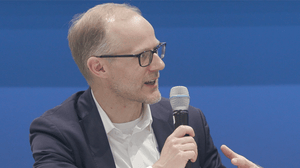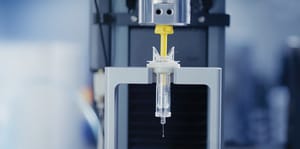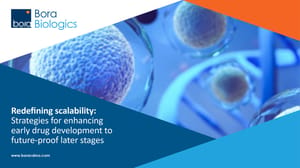Steve McCloskey
, founder and chief executive officer, Nanome
McCloskey began his presentation
by sharing an artificial-intelligence (AI)–generated image of the future of AI-supplemented drug discovery. Although the picture suggested that such a future will be run primarily by machines with minimal human involvement, McCloskey explained that the more immediate future instead will involve the evolution of existing tools. The incorporation of AI and virtual reality (VR) into drug-discovery tools is not likely to replace current technologies, but rather to enhance them. For example, smart devices were developed as an enhancement of computer-monitor setups; scientists still use conventional setups in drug-discovery activities, even in advanced fields such as computational chemistry and protein-structure analysis.
One goal of using AI and VR tools is to analyze three-dimensional data in ways that were not possible before. Mixed-reality experiences, such as that provided by the Varjo XR-3 interface, will enabl...
Johanna Howson
, lead applications scientist, Purolite
David Cartmell
, product manager, Purolite
Ecolab is committed to the long-term success of its clients. The company continually invests in global capacity and new markets for business continuity.
Cartmell emphasized
the value of end users speaking with their raw-materials suppliers: “After the pandemic, many clinical trials and companies were hugely affected by security supply.” Purolite and Ecolab have highlighted supply-chain insecurity “as something that cannot happen again.” Ecolab and its subsidiary Purolite maintain growing innovation pipelines as new molecules enter drug manufacturing and require specialized resins.
Purolite’s new protein A resin, the DurA Cycle resin, purifies monoclonal antibodies (mAbs) and associated protein constructs under variable cleaning strategies. The DurA Cycle resin is designed to drive innovation and performance while reducing the cost of goods (CoG) for manufacturing processes. Developed using Purolite’s Jettin...
Aaron Cowley
, chief scientific officer, ReciBioPharm
ReciBioPharm, a division of contract development and manufacturing organization (CDMO) Recipharm, develops and produces advanced-therapy medicinal products (ATMPs), including plasmids, size-expanded RNA (xRNA), viral vectors, and microbiome therapies. In 2022, the Massachusetts Institute of Technology (MIT) and the US Food and Drug Administration (FDA) awarded a grant of US$82 million to be applied toward speeding process development and making manufacturing compliant with current good manufacturing practices (CGMPs). ReciBioPharm received a majority of the grant to deliver two systems: a non-GMP, laboratory-scale poly(C)-binding protein-1 (CP1) system for manufacturing of ~0.5 g of messenger RNA (mRNA) per day, and a CGMP-grade poly(C)-binding protein-2 (CP2) system for mRNA manufacturing at 0.5–40 g per day. ReciBioPharm already uses the CP1 system in routine, and company expects to begin using the CP2 system in early 2025.
The development project is...
Jon Gunther
, vice president of business development, Just–Evotec Biologics
Gunther emphasized
that although the biopharmaceutical industry should be proud of recent efforts to improve access to biologics, many patient populations remain underserved. The average price per day for one dose of a biologic is still ~22× higher than it is for a comparable small-molecule drug, limiting the number of people who can afford treatment. Only 20% of biologics are sold in markets outside of the United States, Europe, and Canada, indicating further problems with global access. And novel treatments still must be developed for the ~7000 rare-disease indications that have significant unmet medical needs.
Continuous biomanufacturing (CB) could be the production paradigm that enables monoclonal antibodies (mAbs) and other recombinant proteins to reach global patient populations, Gunther said. His company’s CB platform is designed to increase manufacturing agility, diminish processing and regulatory risks, and decrease manu...
Baghirzade began by discussing
Charles River Laboratories’ (CRL’s) role in the viral-vector space and the concept-to-cure portfolio envisioned by the company. “We provide support from early discovery all the way to commercialization, and then we work side by side with our partners throughout that entire drug-development journey.”
CRL has launched three complementary viral-vector platforms. The first two, the nAAVigation and Lentivation platforms, were launched based on client feedback and the needs of the market. They were designed to support early stage drug developers that were still 18 to 24 months away from their first human studies. Baghirzade said that the industry has matured recently, with more products making it to market. To meet increased needs for technology transfers into contract development and manufacturing organizations (CDMOs), in May 2024, CRL announced its Modular and Fast Track viral-vector technology-transfer frameworks.
CRL had a hand in the success of Casgevy (exagamglogene autote...
Curia Global (formerly AMRI) acquired Integrity Bio and LakePharma in 2021 to boost its CDMO business.
Lavezoli discussed
the formation of Curia’s biologics division and future developments. He said that the LakePharma acquisition aided Curia’s large-molecule expansion by providing discovery and manufacturing facilities. Curia’s capabilities are fully integrated, and one of the company’s next big steps is to inform the industry of its readiness to provide end-to-end services, including discovery, process development, and manufacturing.
The TunaCHO technology platform is a proprietary cell line that has enabled the team in San Carlos, CA, to maximize expression titers. That team understands what clients are seeking and performs a number of tasks, from gene sequencing through cell-line development. Curia offers competitive royalty fees for its work, especially when programs are carried through to the company’s GMP manufacturing site in Hopkinton, MA. That site is certified to produce mRNA, therapeutic ant...
Indian biomanufacturing company Enzene Biosciences is set to open a 54,000-ft
2
facility near Princeton, NJ, later this year as its first North American production site. The CDMO offers a fully connected continuous manufacturing (FCCM) process for mammalian-based systems.
Gadgil discussed
his company’s EnzeneX continuous-manufacturing platform, which will be implemented at the New Jersey site later in 2024. Gadgil described the platform as “perhaps the only fully connected continuous manufacturing platform that is available through a CDMO,” with fully end-to-end capabilities.
Gadgil defined
continuous manufacturing
from a bioprocessing perspective as a technique that enables companies to have a consistent stream of products being completed. He said that can be done by using multiple bioreactors and integrating them with a downstream process. He explained that to reduce cost of goods (CoG) and overall carbon footprints, it is important to connect unit operations. Enzene is currently able to manufactur...
Hydrosome Labs is a start-up company that uses ultrafine bubble technology to redefine the potential of water across a number of industries, including the bioprocessing space. The company is based near Chicago, IL, and employs about 12 workers mostly focused on basic science and research and development (R&D).
Jackowetz defined
ultrafine bubbles as being less than 1 µm in size, and typically as small as 100 nm. “These bubbles are so small [that] you can’t see them with your eye,” he said, “and they do not float.” He explained that most of the bubbles that Hydrosome creates are filled with nitrogen and some oxygen, but the R&D team is studying other gases as well. He explained that the bubbles can be used for months without losing stability.
Hydrosome makes bubbles using the principles of
hydrodynamic cavitation
. “With just force and pressure, we can flow water or media with cells in it through our technology,” Jackowetz said about creating the small, stable bubbles. The technology can be used to make m...
In 2023, one of Mowery’s first actions as KBI Biopharma’s chief executive officer (CEO) was to incorporate cell-line development services company Selexis, a fellow acquisition of parent company JSR. “The motivation behind the operational consolidation of Selexis into KBI was to streamline the offering for our customers,”
Mowery said
. The legacy Selexis talent thus enabled the operation of KBI cell-line development in Europe.
Along with the acquisition of Selexis came that company’s SUREtechnology platform. That technology enables KBI to streamline production from clone selection all the way through GMP manufacturing. Mowery said that the technology produces robust cell banks with improved purity compared with other platforms. It also enables customers to move quickly. “We’ve seen some instances,” Mowery said, “where we’re able to do a technology transfer and get some of our customers into GMP manufacturing within nine months.”
Beyond its clone selection technology and cell-line development offerings, KB...
Ecolab is a global company committed to worldwide health and sustainability. Through its subsidiary company Purolite, Ecolab has expanded its outreach further into life sciences, spreading its message of sustainability and seeking to help deliver medicines to patients faster than has traditionally been done in the sector.
To address the latter problem,
Crowe discussed
the supply-chain difficulties that affected the biopharmaceutical industry during the COVID-19 pandemic. She said that although supply chains have replenished in the past couple years, the pandemic drove companies to rethink their strategies. Ecolab has invested significantly in acquiring dual-source supplies not only for securing raw materials and suppliers, but also for supporting customers. Crowe stressed the importance of having a backup plan to ensure the health of the supply chain.
She said that one of the biggest challenges faced by the industry is the diversity of molecules developed in the space. Customers have expressed concern a...
Rentschler Biopharma is a CDMO that produces eight marketed biopharmaceutical products, four of which were approved in 2023.
Von Braunmühl said
that the companies his organization has worked with have achieved a 70% commercial-success rate. He credited the strong partnerships that Rentschler has built along with its communication and consultation expertise, which has helped developers enact successful CMC strategies. “Almost 25% of the FDA-approved biopharmaceutical products came through Rentschler,” von Braunmühl said. He pointed out that by outsourcing production to his company, large clients can focus on clinical trials and marketing. On the other hand, Rentschler also helps small companies to manufacture products for rare diseases, because they frequently don’t have their own manufacturing sites.
On the topic of manufacturing, von Braunmühl addressed Rentschler’s recent Milford, MA, facility expansion, marking the company’s largest capital expenditure in its 50-year history. The new site added 22,000...
Samsung Biologics has long played a major role in biomanufacturing and continues to shake the industry with major capital expenditure (CapEx) projects. It currently has 604,000 L of manufacturing capacity through four plants at its Bio Campus I site in Songdo, South Korea. The company currently is building Bio Campus II, an even larger site that will begin with 180,000 L of capacity at plant 5, with room to add three more plants of the same size.
Sharp said
that the expansion is being driven by growth of demand in several spaces, including oncology and immunology, with antibodies continuing to play a strong role within biopharmaceutical pipelines.
According to Sharp, Samsung Biologics partners with 16 of the top 20 global biopharmaceutical developers, and the CDMO has more than 110 total clients, including small and mid-size biotechnology companies. Sharp said that big multinational companies have larger pipelines with multiple-product portfolios. However, “Smaller [and] mid-sized biotechs sometimes foc...
Syngene International, a subsidiary of Indian drug maker Biocon, continues to grow its contract research organization (CRO) and CDMO businesses. In 2022, it signed a 10-year production contract with animal health company Zoetis to manufacture the drug substance for Librela (bedinvetmab), a mAb used to treat osteoarthritis pain in dogs. The company is expanding its manufacturing capabilities, having acquired a vaccine facility in 2023 from Stelis Biopharma in Bangalore, India.
Syngene began as a research business, and Del Priore credited the company’s relationship with Zoetis for its manufacturing growth and its expansion into the US market after 30 years of specializing in early stage development. He said that Syngene has made 150 batches of product over the past two years. “It’s really put us on the map as [a company] that manufactures at the commercial scale.” He explained that Syngene has drawn interest from biopharmaceutical developers of all sizes that are seeking help in taking their ideas into all ...










